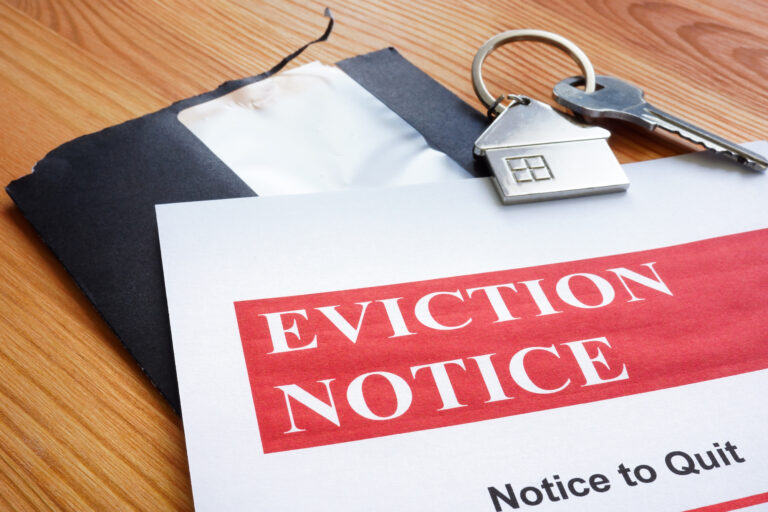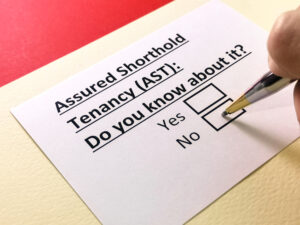This is the legal tool that a landlord can use to regain ownership of a property that is rented under an Assured Shorthold Tenancy. The landlord can request you to leave the property at any time, and you have a grace period of two months under Section 21. While it is the first stage of the eviction process, it alone is not regarded as an eviction. Find out more about Section 21 below.
Introduction
A short hold tenancy is most likely used by people who rent from private landlords. An eviction process can be initiated by the landlord to regain ownership of their property in this state. Especially if you are happy in your rented home with no intention of moving, this can be unsettling. Don’t worry, you haven’t done anything wrong. If you did not comply with the tenancy agreement, the “short hold” clause gives them a reasonable right to their property.
The eviction procedure is not as complicated as most people imagine. It’s not really feasible to return from work to find all your possessions waiting for you on the street. Rather than a section 21 form, you will receive a notice to quit in the mail.
What is a Section 21 notice?
According to the Housing Act 1988, landlords are entitled to repossess their properties at the end of an assured short hold tenancy. Legally, the owner, however, must follow carefully defined procedures. This starts with a section 21 notice. The letter is a notice that the landlord must serve to the tenant before the eviction process can begin. Informational in nature, a notice to quit has no legal force.
What must be included in section 21
There are several items that must be included in the notice to quit even if it can be written in a relatively free form.
- It is imperative that this be written as a section 21, in its correct variation (more below), under the Housing Act of 1988.
- The request must be in writing. The only time a notice to quit can be verbally served is when a renter is lodging. The renter shares a common area with his landlord.
- The start and end dates must be specified. Two months between dates is always a good rule of thumb. An eight-week notice period is required if the tenancy is on a weekly basis.
- The certificate will remain valid for 12 months after the expiration date.
- Section 21 notices expire when they are served, and a new one must be served before going to court.
The notice to quit is essentially a polite request to leave. Tenants have the option of moving out or staying. Ultimately, the court decides whether to evict the tenants. Once the Court bailiffs execute the order of possession, the case ends.
A notice to quit can be served by the landlord at any time. Some criteria must be met for it to be effective. Each section 21 form has two versions depending on the type of tenancy.
Section 21 for tenants on a fixed-term contract
The term of a fixed-term tenancy is usually six or twelve months. “No fault” evictions are prohibited during the fixed term. This includes evictions under section 21. The notice to leave can still be served by the landlord, but it must be respected until the fixed term expires. Start and end dates are not as important, but the end date must fall no earlier than the last day of the fixed period. It must also comply with the law’s two-month notice period.
The landlord can use Section 21(1)b for fixed-term tenancies.
The owner must use a different route if he wants to evict before the fixed term is over – a section 8 notice. Generally, a Section 8 notice is issued when a tenant has broken the terms of their contract – for instance, when they are two months behind on their rent. To obtain a possession order, there are several other uses; however, all of them require solid grounds that must be presented to the court.
Periodic tenancies under Section 21
Payment periods determine the length of periodic tenancies. Payments are usually made monthly. When a fixed-term tenancy expires, it automatically becomes a periodic tenancy. It is relatively easy and fast for landlords to evict tenants when they have periodic tenancies.
The Section 21(4)a form can be used by landlords.
The tenant must have two full months to leave the premises after receiving a notice to quit. A tenancy period must always end on the last day of the period. In the case of consecutive months, this would be the 19th day. It is normal for tenancy periods to correspond with rent payment dates. You should check your tenancy agreement for exact details, as this may not be the case in every case.
In what circumstances is a section 21 invalid?
To be legally valid, notices of resignation must meet a number of requirements. Section 21 becomes invalid if there is an error. A new eviction must be served if there is an error. Resetting the timer will give the tenant more time to leave. That’s why checking for errors in the notice to quit is important.
• There was no protection for the tenancy deposit
A landlord’s responsibility is to protect the tenancy deposit. Inability to do so is usually a sign of a tenant’s unwillingness to solve problems and work in his or her interest.
- An authorised scheme must protect the tenancy deposit.
- This company should have provided the tenant with a set of prescribed information.
- Lastly, both actions must be taken
If your landlord has not protected the tenancy deposit, the section 21 notice becomes invalid. A dispute must be filed in either: My Deposits, The Dispute Service or Deposit Protection Service within 30 days of receiving the deposit.
The notice is invalid if you did not receive the required information.
Upon the expiration of this 30-day period, tenants can also sue for failure to protect the deposit. This claim cannot be retracted. A court will have no choice but to award the tenant 1 to 3 times the deposit, as the owner is required to pay. This would invalidate the section 21.
If a landlord reimburses the full amount of the original deposit (aside from any rewards awarded by the court), he or she is eligible to use section 21 once again.
Section 21 notices and the tenancy deposit laws are complex. We recommend seeking legal assistance if you are about to claim the deposit.
• Landlord renews tenancy
Only the current tenancy is covered by Section 21. Whenever a tenancy ends legally, the notice to quit expires as well. Tenancies can be renewed either for a fixed term or for a periodic tenancy. An increase or decrease in rent requires a new tenancy, so any notice is invalid.
The fixed term is always respected in Section 21 notices. The section 21 must end no sooner than the last day of the new fixed term if your landlord has renewed the term. If you serve the notice before the new contract takes effect, it is invalid.
• If you live in an HMO that is not licensed
Do you share the property with others? In this case, you reside in a house of multiple occupations – HMO. These buildings require a special license if they shelter more than five people from different households. Landlords must obtain the council’s permission before renting out their property, otherwise, they are committing an illegal act. In this situation, no-fault evictions cannot be used.
• There have been illegal charges, fees, or deposits collected from you by your landlord or agent
A tenant’s fees, other than those on a carefully defined list, are banned and illegal under the Tenant Fees Act 2019. The amount of all tenancy deposits and holding deposits is capped.
When a landlord or letting agent has taken excessive fees and deposits and has not returned them to the tenant, the landlord or letting agent loses the right to use Section 21 until the problem is resolved. In the event of a breach of the Tenant Fees Act, any notice served is automatically deemed invalid. A new notice will be issued by your landlord or agent after the problems have been rectified.
Section 21 mistakes landlords commonly make
A notice to quit that includes some important details spelled incorrectly is likely to be invalid.
Here are a few things you need to be aware of:
- The tenant’s name is spelled correctly
- The correct address of the rented property
- When the notice period should begin and end
- Name and contact information for the landlord and letting agent, if any
Keep in mind that the start date is when you are served the notice, not when the landlord drafts it.
If the notice is issued during a contractual periodic AST, it must meet all of these requirements and also:
- End when your tenancy ends or contain a valid ‘saving clause’
- Explain that possession is required by Section 21 of the Housing Act 1988
A section 21 form should be used in the proper situation as well as the correct version. There is one form for fixed-term tenancies 21(1)(b), one for periodic tenancies 21(4)(a) and one for contractual periodic tenancies.
Section 21 for tenancies entered or continued after October the 1st 2015
You can serve a section 21 notice in any form you like if you’ve entered a tenancy before the 1st of October 2015.
A few more regulations have been added to the tenancies signed or renewed since that date. In the past, landlords with ill intentions have abused the no-fault eviction process. A new set of requirements for legal, no fault evictions was introduced by the government to provide security for renters.
- Tenancy began within four months of serving the notice
Section 21 notices cannot be served at any time before the fourth month after the start of the tenancy. This period begins counting once the original tenant signs the lease, whether it was transferred to a new tenant, renewed, or if the tenant has sublease the property.
- Rent is paid on a different schedule, such as quarterly.
You must increase your notice period from two months to whatever your rent payment period is. You must be given three months of time if you pay rent four times. This period must end right before the next rent period begins.
A tenant is entitled to additional information about a property:
- Certificate of energy performance
- The current gas safety record
- Government guide on renting (Usually, you need a paper copy or an e-mail as a substitute.)
- Tenant complains about repairs
You might be in violation of the law if your landlord serves you with a section 21 after you complain about repairs. Bad landlords resort to revenge evictions or “retaliatory evictions” when they have tenants.
Landlords use eviction as a tool to keep tenants quiet whenever friction or complaints may arise from tenants. A section 21 can’t be used for this type of abuse and harassment. You will be served with a notice to quit if:
- The landlord has been notified in writing of the tenant’s issues and repairs
- The landlord did not resolve the issues
- Repairs and maintenance are not done by the landlord
- Lack of repairs have been reported to the council by the tenant
- A notice of improvement has been served on your landlord by the council
- A notice has been served that emergency works will be undertaken by the council
What happens after the section 21's two months are up
It will be expected of the tenant to leave by the end date if the notice was legally served and provided two months’ notice. Landlords can seek assistance from the court if the rental agreement has expired, but the renter has not left the property.
Section 8 – notice of attempted possession is typically issued by landlords. Meanwhile, a court order for possession will also be sought. Under the order, the tenant must vacate by the specified date.
An eviction date will be determined in accordance with the landlord’s grounds for eviction. When legal reasons apply, such as rent arrears, the period can be as short as two weeks. Antisocial behaviors can even be dealt with immediately.
Possession orders can be executed by court bailiffs when the landlord has them. You cannot be physically evicted from a property by its owner, but a bailiff can. All pertinent information will be included in a letter that you will receive when the landlord schedules the date with them. As the bailiffs enter your home on the appointed day, they will remove your belongings as well as escort you out. In that case, the tenancy will come to an end, and the eviction will take place.
Disclaimer
The purpose of this article is to provide guidance. The information provided should be used for research purposes, and not as a basis for bringing legal action. No legal advice is provided by The Tenants Hub, and The Tenants Hub’s content does not establish a client-solicitor working relationship.


